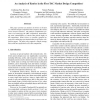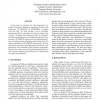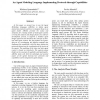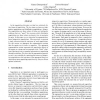109
click to vote
IAT
2008
IEEE
15 years 7 months ago
2008
IEEE
This paper extends the link between evolutionary game theory and multi-agent reinforcement learning to multistate games. In previous work, we introduced piecewise replicator dynam...
102
click to vote
IAT
2008
IEEE
15 years 7 months ago
2008
IEEE
By feeding personal e-mails into the training set, personalized content-based spam filters are believed to classify e-mails in higher accuracy. However, filters trained by both sp...
IAT
2008
IEEE
15 years 7 months ago
2008
IEEE
In situations where Bayesian networks (BN) inferencing approximation is allowable, we show how to reduce the amount of sensory observations necessary and in a multi-agent context ...
105
click to vote
IAT
2008
IEEE
15 years 7 months ago
2008
IEEE
In intelligence analysis, information plays an important role in solving problems and making decisions. However, an increasing number of malicious behaviors, most of which come fr...
IAT
2008
IEEE
15 years 7 months ago
2008
IEEE
This paper presents an analysis of entries in the first TAC Market Design Competition that compares the entries across several scenarios. The analysis complements previous work a...
IAT
2008
IEEE
15 years 7 months ago
2008
IEEE
We aim at providing artificial agents with logical tools to reason specifically on privacy-related regulations, in order to comply with them. In order to express these regulatio...
IAT
2008
IEEE
15 years 7 months ago
2008
IEEE
The reason for using distributed constraint satisfaction algorithms is often to allow agents to find a solution while revealing as little as possible about their variables and co...
IAT
2008
IEEE
15 years 7 months ago
2008
IEEE
In this paper we introduce the Semi-Cooperative Extended Incremental Multiagent Agreement Problem with Preferences (SC-EIMAPP). In SC-EIMAPPs, variables arise over time. For each ...
125
click to vote
IAT
2008
IEEE
15 years 7 months ago
2008
IEEE
In this paper we present how to use the Agent MOdeling LAnguage (AMOLA) to define agent interaction protocols and how to integrate these in an agent model. AMOLA provides the synt...
IAT
2008
IEEE
15 years 7 months ago
2008
IEEE
In the negotiation literature we find two relatively distinct types of negotiation. The two types are known as integrative negotiations and distributive negotiations. Integrative...




